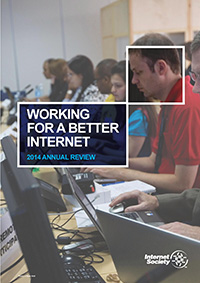2014 Strategic Objectives
As a unique platform for innovation, creativity, and economic opportunity, the Internet unequivocally has made the world a better place. In 2014, we found an Internet landscape changing at an accelerating pace, with new opportunities and challenges emerging more rapidly than at almost any other time in our history.
World events have highlighted the role of the Internet as a tool for expressing fundamental human rights and freedoms, and as a platform for citizens to voice their opinions and strengthen democratic participation. Yet we have also witnessed increased attempts by governments to limit or disrupt citizens’ access to the Internet and to conduct surveillance activities that significantly erode users’ expectations of online privacy. Internet penetration continues to increase across the globe, however, many developing economies still face significant challenges in building access infrastructure, growing local online industries, and creating policy and regulatory environments that allow their societies to realize the full economic and social benefits of the Internet.
While we celebrate the Internet’s phenomenal successes, we also see that the future of its foundational tenets, including distributed and de-centralized management and development, open and voluntary technical standards, global network interoperability, and the participatory multistakeholder model of Internet governance remain far from assured. In this time of great change, the Internet Society stands firm in its commitment to lead from a core set of values and principles and to ensure that the fundamentals of an open, global Internet are nurtured and sustained so that all people around the world can benefit from the opportunities of the modern information society.
- Strengthen and defend the open development and evolution of the Internet, including open Internet standards, technology and infrastructure development, deployment, and innovation.
- Advance the open, participatory, multistakeholder model of Internet governance and policy approaches that support Internet principles and user-centricity.
- Bridge the digital divide by growing Internet connectivity and capabilities throughout the world, with special emphasis on developing regions.
- Advocate for the open, global Internet for all the world’s people.
2014 Highlights and Accomplishments
Routing Resilience Manifesto and MANRS Launch
Promoting collective responsibility for the Internet’s resilience and security
Throughout the Internet’s history, collaboration among participants and shared responsibility for its seamless operation have supported tremendous growth, security, and success. Technology solutions are essential, but not enough on their own. So how can network operators work together to improve the security and resilience of the global routing system?
Global Internet Report
Quantifying and visualizing the Internet’s impact
It’s hard to imagine a time before the Internet, particularly considering the nearly three billion people who use it. And though its presence seems ubiquitous today, the future of the open Internet we enjoy today isn’t guaranteed.
Internet Governance Forum
Working across continents to shape the Internet’s future
The Internet Governance Forum (IGF) is a global conference that invites all to contribute to the future of the Internet. Launched almost a decade ago, the IGF provides a unique annual opportunity to build relationships and share ideas and experiences about proven approaches to key Internet issues.
Operators and the IETF
Gaining operational insights to steer actionable development
The Internet Engineering Task Force (IETF) makes the Internet work better by producing high quality, relevant technical documents that influence the way people design, use, and manage the Internet. But to be effective, those documents must be informed by operational realities. So in 2014, the Internet Society’s Deployment and Operationalization Team launched a three-phase project designed to foster more open communication between the operator community and the IETF to help refine requirements—and bolster engagement.
Connect Platform
Making information exchange easier with a shared destination
It’s easier to solve problems when great minds come together around shared information. In Q2 2014, the Internet Society launched Connect—a collaboration portal designed to help make international cooperation and actionable discussion an integral part of every day.
Chapter Workshops
Building communities of trust to strengthen impact
Internet Society Chapters are the lifeblood of our global mission. They bring together individuals on a volunteer basis with a shared interest in advancing our objectives to form vibrant communities committed to the Internet Society’s mission. They organize programmes and activities of value to the regions in which they live and work.
Inforum and Online Courses
Empowering our community with online learning and leadership resources
Since its inception, the Internet Society has committed to fostering a community of leaders and influencers who can effectively navigate across complex Internet technology, policy, and development issues.
